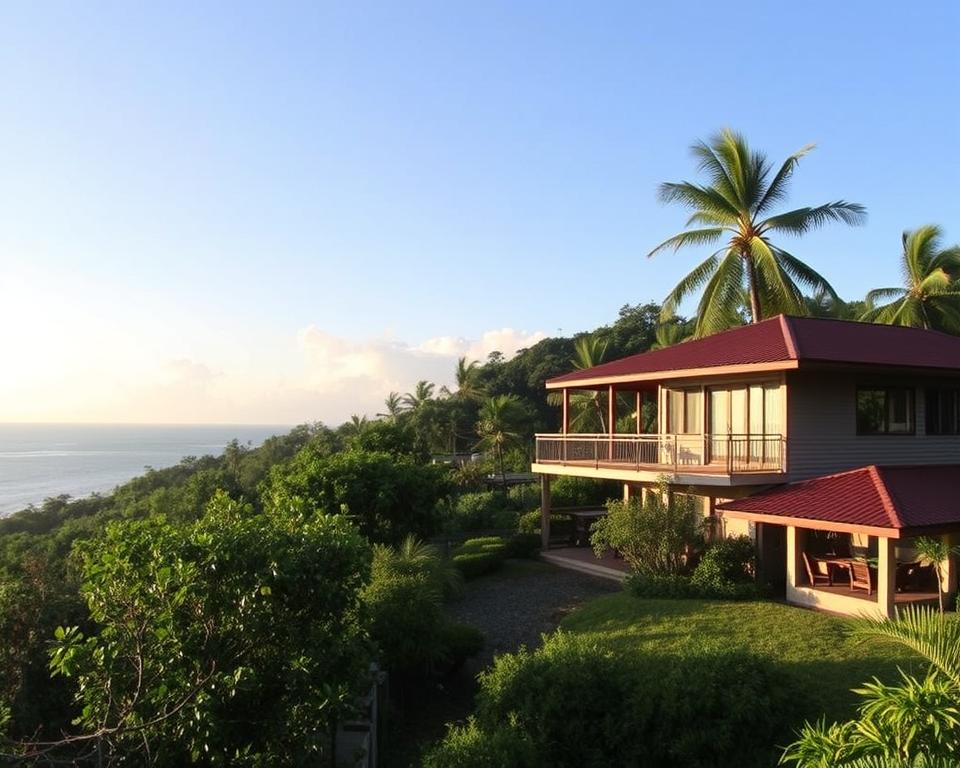Home Selling Cost in Costa Rica: Expert Guidance
At Gap Real Estate, we simplify buying, selling, or investing in Costa Rica with over two decades of coast-to-coast experience. We deliver seamless transactions through expert guidance, clear communication, and relentless dedication to your goals.
Selling property in Costa Rica involves specific costs and procedures that differ from other real estate markets. Understanding the complete breakdown of selling costs is essential for both local and foreign property owners.
The total cost of selling property typically ranges between 4-6% of the property’s sale price, encompassing various fees, taxes, and legal requirements. Our expert team has successfully guided countless clients through the selling process, ensuring transparent transactions and optimal financial outcomes.
Understanding the Real Estate Market in Costa Rica
With over 20 years of experience, we have developed a keen insight into the Costa Rican property market, enabling us to guide you through the process. Whether you’re planning to sell your home, land, lot, condo, or any other type of property, understanding the current market conditions and regional variations in property values is crucial for a successful transaction.
Current Market Trends and Conditions
The Costa Rican real estate market is dynamic, influenced by factors such as tourism, expat migration, and local economic conditions. Currently, we are observing a trend towards increased interest in emerging markets, particularly in the Southern Zone, where infrastructure improvements are attracting new buyers.  Luxury properties in areas like Peninsula Papagayo and Manuel Antonio continue to command high prices due to their exclusivity and amenities. Understanding these trends is essential for setting competitive pricing and marketing strategies.
Luxury properties in areas like Peninsula Papagayo and Manuel Antonio continue to command high prices due to their exclusivity and amenities. Understanding these trends is essential for setting competitive pricing and marketing strategies.
Regional Variations in Property Values
Property values in Costa Rica vary significantly across different regions. Beachfront properties in popular tourist destinations are highly valued, while inland properties offer more affordable options. The Central Valley, including San José, provides a balance of affordability and amenities, appealing to both locals and expats. Emerging regions are seeing increased interest, driven by improving infrastructure and growing demand. Working with local real estate experts is key to understanding these regional dynamics and determining the optimal pricing for your property.
Breaking Down Home Selling Costs in Costa Rica
When selling a property in Costa Rica, understanding the various costs involved is crucial for a smooth transaction. The total cost of selling a home includes several components, and being aware of these expenses can help both buyers and sellers navigate the process more effectively.
Transfer Tax (1.5% of Property Value)
The transfer tax in Costa Rica is a significant cost associated with selling a property. It is calculated as 1.5% of the property’s value. This tax is typically paid by the seller, but it can be negotiated as part of the sale agreement.
National Registry Stamps and Documentary Stamps
Additional costs include National Registry stamps and documentary stamps. These fees cover the registration of the property transfer and other legal documents. The costs can vary depending on the property’s value and the complexity of the transaction.
Notary Fees and Legal Representation
Notary fees are another essential cost to consider. In Costa Rica, notaries play a crucial role in the property transfer process, ensuring that all legal requirements are met. The fees for notary services can vary, and it’s also common for sellers to hire legal representation to navigate the process.
Escrow Services and Associated Costs
Escrow services provide a secure mechanism for handling funds during property transactions. The typical escrow fees range from 0.25% to 0.5% of the property value. While not legally required, escrow services are highly recommended, especially for international transactions or deals involving substantial earnest money deposits.
Escrow services offer several benefits, including:
- Secure third-party mechanism for handling funds
- Protection for both buyers and sellers throughout the process
- Additional services such as document handling and coordination between parties
- Release of funds only when specific conditions are met
The cost of escrow services is traditionally split 50/50 between the buyer and seller, though this can be negotiated. When selecting an escrow provider, it’s crucial to choose a reputable company with proper insurance coverage.
Direct vs. Indirect Property Sales
Understanding the nuances between direct and indirect property sales is crucial for anyone looking to invest in Costa Rica’s property market. The choice between these two methods can significantly impact the transaction’s complexity, costs, and legal implications.
Direct Purchase Process and Costs
A direct purchase involves acquiring the property title directly from the seller. This process is straightforward and typically involves a notary public to ensure the transaction’s legality. The costs associated with a direct purchase include transfer tax, notary fees, and legal representation. In Costa Rica, the transfer tax is 1.5% of the property’s value. While this method is more transparent, it requires more upfront costs compared to an indirect purchase.
Indirect Purchase Through Corporate Ownership
An indirect purchase occurs when a buyer acquires the capital stock of a corporation that owns the property, rather than the property title itself. This method is contingent upon the seller holding the property under a corporation that is in good standing. The costs involved include transfer tax, legal fees for stock transfer, and corporate updates. Although it may seem more complex and risky due to the potential for inherited liabilities, an indirect purchase can offer certain advantages, such as privacy and potentially lower registration fees.
However, thorough due diligence is essential to mitigate risks associated with indirect purchases. Buyers must review corporate records, tax filings, and potential liabilities comprehensively. While changes in Costa Rican law have reduced the tax advantages of indirect ownership, it remains a viable option for some investors, particularly for estate planning and liability protection.
Who Pays What: Negotiating Closing Costs
When selling a property in Costa Rica, understanding who pays what during the closing process is crucial. The allocation of closing costs between the buyer and seller can significantly impact the overall cost of the transaction.
Standard Cost-Sharing Practices
In Costa Rica, a common practice is to split closing costs 50/50 between the buyer and seller. This approach helps to distribute the financial burden fairly, but it’s not a hard and fast rule. The actual division of costs can be negotiated as part of the sale agreement.
Negotiation Strategies for Buyers and Sellers
Buyers and sellers in Costa Rica can negotiate the allocation of closing costs as part of their sale agreement. Sellers may agree to cover a larger portion of the costs to attract buyers or to expedite the sale. Conversely, buyers may be willing to take on more costs if it means securing a better purchase price. Effective negotiation requires understanding the total costs involved and being flexible.
Handling Existing Mortgages and Liens
When a property with an existing mortgage is sold, the seller is typically responsible for ensuring the mortgage is fully paid off and removed from the property title. The closing attorney plays a crucial role in this process, holding funds necessary to pay off the mortgage and verifying that the title is clear before completing the transaction. Any costs associated with clearing the mortgage, including early payment penalties, are generally the seller’s responsibility.
Legal Considerations and Due Diligence

Navigating the complexities of Costa Rican real estate law requires careful consideration and expert guidance. When selling a property in Costa Rica, it’s essential to understand the legal requirements and obligations to ensure a smooth transaction.
Importance of Title Searches and Property Verification
A title search is a critical step in the property selling process, verifying that the property title is clear of any liens or encumbrances. This process ensures that the seller has the right to sell the property and that the buyer is acquiring a clear title. In Costa Rica, notary publics play a significant role in this process, acting as agents of the State and handling a wide range of legal tasks related to real estate transactions.
Working with a Qualified Costa Rican Attorney
Engaging a qualified Costa Rican attorney is vital for navigating the legal complexities of property sales. An experienced attorney can provide guidance on the legal requirements, ensure compliance with Costa Rican laws, and facilitate communication between the buyer and seller. Their expertise is particularly valuable in handling matters such as property verification, contract drafting, and negotiations.
Common Legal Pitfalls to Avoid
Sellers should be aware of several common legal pitfalls when selling property in Costa Rica. These include ensuring that all identification documents are current and properly authenticated, complying with tax identification requirements, and preparing necessary documentation such as power of attorney if needed. Additionally, understanding capital gains tax considerations and potential withholding requirements is crucial for a smooth transaction.
Documentation Requirements for Foreign Sellers
Foreign sellers must comply with specific documentation requirements. This includes having current identification documents authenticated with an apostille or similar certification, obtaining a local tax ID if necessary, and preparing corporate documentation if the property is owned through a corporate entity. Ensuring that all utility services are transferred to the new owner and obtaining final payment receipts is also essential to avoid lingering liabilities.
By understanding these legal considerations and due diligence requirements, sellers can navigate the complexities of selling property in Costa Rica with confidence. Our end-to-end support services handle the intricacies of the process, from relocation logistics to legal details, ensuring a seamless experience for our clients.
Conclusion: Navigating Your Property Sale with Confidence
With the right guidance, navigating the home-selling process in Costa Rica becomes significantly easier. The total cost of selling a property typically ranges between 4% and 6% of the property’s sale price, encompassing various components such as legal fees, transfer taxes, realtor commissions, and escrow fees.
At Gap Real Estate, we simplify the process of buying, selling, or investing in Costa Rica. With over two decades of coast-to-coast experience, we deliver seamless transactions through expert guidance, clear communication, and relentless dedication to your goals.
Successfully navigating the home-selling process requires understanding the complete cost structure and working with experienced professionals who understand both the legal requirements and regional market conditions. Planning for closing costs from the beginning allows for more accurate financial projections and helps avoid unexpected expenses.
For foreign sellers, our bilingual team provides essential support throughout the process, ensuring that nothing is lost in translation. Whether you’re selling a beachfront property, mountain retreat, or urban condominium, understanding the specific market factors that influence your property’s value is crucial.
Contact Gap Real Estate today at +(506)-4001-6413 or [email protected] to discuss your property selling needs and discover how our expertise can help you achieve a successful and stress-free transaction.




